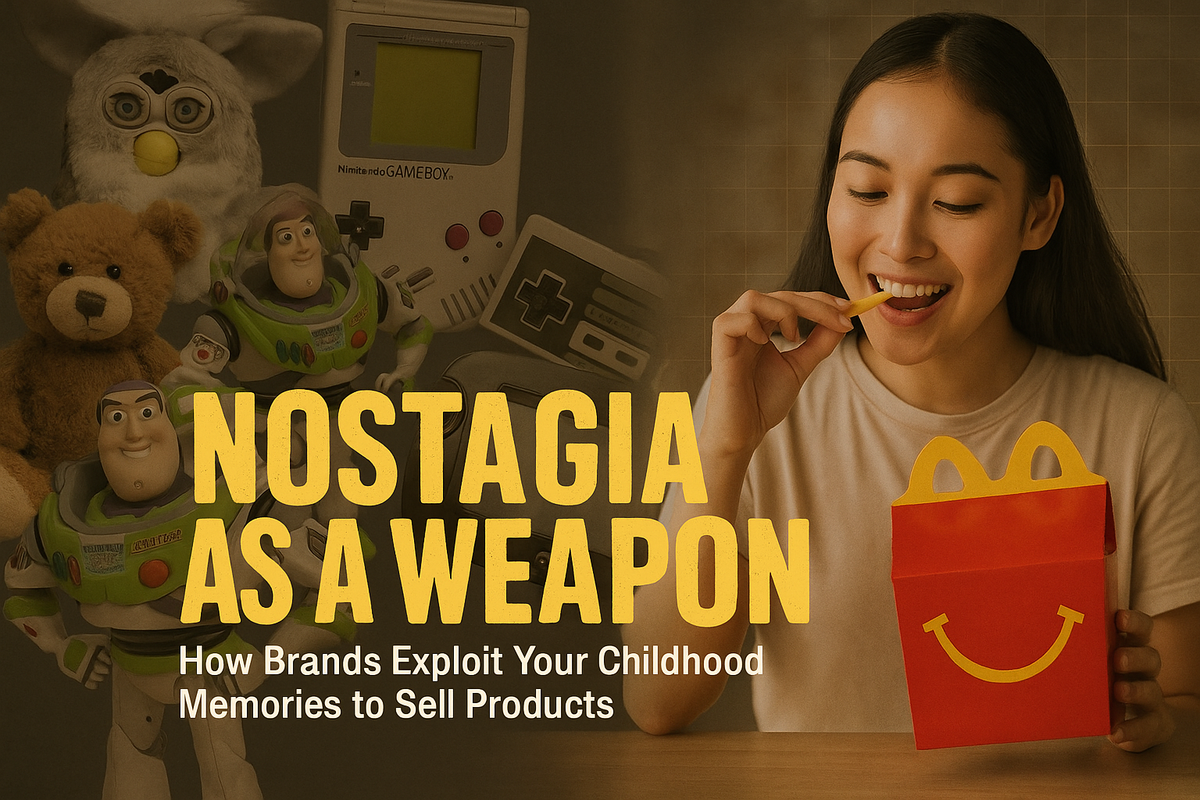Nostalgia as a Weapon: How Brands Exploit Your Childhood Memories to Sell Products
From retro logos to reboots of 90s cartoons, brands are turning your childhood memories into marketing gold. But this isn’t just cute it’s calculated. Nostalgia is being weaponized to bypass logic and trigger emotion-driven purchases you didn’t plan to make.

Nostalgia is not a warm, fuzzy sensation. It is a weapon.
In a hyper-saturated market where products flood the shelves every second, brands discovered the key to cutting through the noise: dig deep into your memory, pick out a comforting picture, and apply it to whatever they're trying to sell you.
Over the past ten years, nostalgia marketing has reached multi-billion-dollar status. From fast-food restaurants bringing back old menus to streaming services remaking classic shows, businesses have learned that nothing draws your eye or your wallet like the desire for bygone days.
This is not a coincidence. It's a deliberate, data-based play that observes what you enjoyed as a child and then weaponizes it as a way of driving sales. And it's succeeding so well that it's transforming industries.
Here's how nostalgia has been weaponized and how you must protect yourself.
The Science of Nostalgia: Why You Feel It
Before we delve into how brands use it to their advantage, it is helpful to know why nostalgia is such a powerful tool.
Nostalgia is a neurochemical experience. When you look at a picture or listen to music from your early years, your brain secretes a cocktail of dopamine and oxytocin the same neurotransmitters that induce feelings of safety, belongingness, and love.
This is not sentimentality. Research stored on Archive.org from the Journal of Consumer Research indicates that nostalgia diminishes critical thinking and decreases price sensitivity. To put it simply: when you're nostalgic, you don't just feel happy you get more easily sold on things.
The Data Goldmine: How Companies Track Your Memories
As soon as brands figured out how powerful nostalgia was, they constructed whole surveillance systems to tap into it.
Here's the process:
- Data Harvesting
Firms gather your search history, streaming habits, and buying history. Ever curious about why you're suddenly getting ads for 90s cartoons you haven't talked about in years? You were leaving a trail of breadcrumbs.
- Cohort Segmentation
Marketers group you together with individuals who were raised during the same time period using demographic information. You've likely watched countless reboots of the same handful of franchises if you were born between 1980 and 1995.
- Algorithmic Targeting
Sites such as Facebook and Google present you with ads tailored to elicit nostalgic triggers at optimal engagement times.
According to Google Trends data, searches for "retro," "nostalgic," and "throwback" have increased more than two-fold over the past five years. Companies are taking notice and spending a lot of money to cash in.
Case Study: The Great Reboot Economy
A record five of the most-streamed shows of 2023 were reboots or sequels.
- Full House recurred as Fuller House.
- Saved by the Bell rebooted for Gen Z.
- Friends reunion specials broke viewing records.
Why does this work so well? Because reboots are cheaper to promote. Familiarity means ready-made audiences, eager to relive the magic.
A Warner Bros. press release called nostalgia "a durable brand asset" a euphemistic way of saying your memories are being commodified.
When Nostalgia Becomes Manipulation
All nostalgia marketing is not benign. Occasionally, it becomes manipulative:
- Scarcity of Limited Edition
Companies deliberately manufacture fake shortages such as Nintendo's Classic Mini game console to induce panic purchasing.
- Emotional Manipulation
Commercials evoke images of childhood to make consumers feel lost or guilty, only to provide solutions in the form of products to relive those emotions.
- Brand Rewrites
Some brands rebrand their past to cover up previous controversies. Recall how Coca-Cola rolled out New Coke in 1985? They now rely very heavily on "classic" branding and cover up their mistakes.
Fast Food: The Battle Zones of Nostalgia
Fast food chains are masters at nostalgia warfare.
In 2022, McDonald's released adult Happy Meals complete with vintage toys. The effort went viral, and stores sold out within days. As Google Trends shows, searches for "McDonald's nostalgia" jumped 350% that quarter.
Other companies swiftly followed:
- Pizza Hut restored their red-roof dine-in appearance.
- Burger King brought back their 1970s logo.
- KFC went back to retro packaging and taglines.
It's a clever move: these companies aren't selling you a burger—they're selling you the sensation of being eight years old, with no care and no calories.
The Political Side of Nostalgia
Nostalgia sells more than just products. It sells ideologies.
Political campaigns increasingly use nostalgic narrative to get you to think the past was greater and that their candidate can restore it.
"Make America Great Again" is the most iconic example, but far from the only one. Justia court filings indicate that several campaigns have trademarked slogans that specifically evoke bygone days.
These tactics weaponize longing to bypass critical thinking. When you’re yearning for an imaginary past, you’re less likely to ask hard questions about the present.
Toys and Collectibles: Profiting from Your Inner Child
Toy companies are thriving by turning nostalgia into luxury.
Consider Funko Pop vinyl figures. Originally a niche hobby, they exploded into a multi-billion-dollar business by tapping into millennial and Gen X memories.
In 2023, Hasbro announced a new line of “retro collectibles” priced significantly higher than the originals ever were.
Hasbro’s official press release described them as “affordable luxury for a new generation,” but the reality is simpler: they’re betting you’ll pay extra for the privilege of reliving childhood.
Video Games: Monetizing the Past
Gaming companies have perfected the art of nostalgia exploitation.
Nintendo's repeated re-releases of classic games Super Mario 64, Ocarina of Time have raked in billions without the need for new development.
A 2021 report by Archive.org revealed that re-releases made up almost 40% of Nintendo's profits in that year.
Other firms have done the same:
- PlayStation's old console versions sold out immediately.
- Microsoft bundled up classic Halo games as "anniversary editions."
- Sega released Genesis classics for newer consoles.
These re-releases aren't all about enjoyment. They're about creating a recurring subscription plan that has you committed to paying for the same material repeatedly.
When Nostalgia Falls
Naturally, nostalgia marketing doesn't always work.
Crystal Pepsi, the 1990s soda, relaunched in 2016 but crashed and burned. Why? Because although folks remembered it, they didn't always enjoy it.
This indicates nostalgia is not a sure thing. It must be coupled with genuine affection and not cynical rebranding.
How to Protect Yourself from Nostalgia Manipulation
If you'd like to put an end to brands using your past against you, follow these few tips:
- Notice the Feeling
When you notice a flashback feeling of nostalgia, stop. Ask yourself: "Is this product really helpful to me, or am I being sold a memory?"
- Fact-Check the Story
Research if the brand's history is actually as wholesome as they say.
- Set a Budget
Plan on allocating a "nostalgia fund" to prevent impulse buying.
- Value Experiences Over Objects
Rather than purchasing collectibles, reshop and replay memories with family and friends.
The Future of Nostalgia Marketing
If anything, exploitation of nostalgia is speeding up.
New technologies particularly AI are set to make it even more intrusive. Deep learning algorithms can now create custom ads based on your pictures, previous buys, and previous social media posts.
Netflix, in 2024, patented (accessed through CourtListener) an AI engine that dynamically compiles trailers based on "nostalgic hooks" that are specific to individual users. The next wave of nostalgia marketing won't be solely a matter of shared generational experience. It will be about your particular personal story repackaged and retailed back to you in the moment.
Conclusion: Memory as Marketplace
Nostalgia was once an intimate feeling a bittersweet look back at what had been.
It is now a product. Brands have learned that your memories are the most effective means of evading your defenses and encouraging purchases.
The next time you get the pull of nostalgia when you glimpse a reboot, retro logo, or "classic" keepsake, keep this in mind: you're not merely experiencing nostalgia. You're experiencing the strongest tool available in contemporary marketing being directed at your purse.
Sources
- CourtListener. Netflix Nostalgic Hook Patent Filings. courtlistener.com
- Justia. Trademark Applications for Nostalgia-Based Political Slogans. justia.com
- Archive.org. Journal of Consumer Research on Nostalgia and Spending. archive.org
- Google Trends. Search Trends for Nostalgia Keywords (2015–2024). trends.google.com
- Warner Bros. Official Press Release: Nostalgia as Durable Brand Asset. warnerbros.com
- Hasbro. Official Press Release: Retro Collectibles. hasbro.com
- Nintendo Financial Reports. Archived Data on Re-releases. archive.org
- McDonald’s Corporate Newsroom. Adult Happy Meal Launch. mcdonalds.com
For more legal exposes and truth-behind-glamour stories, subscribe to AllegedlyNewsNetwork.com




